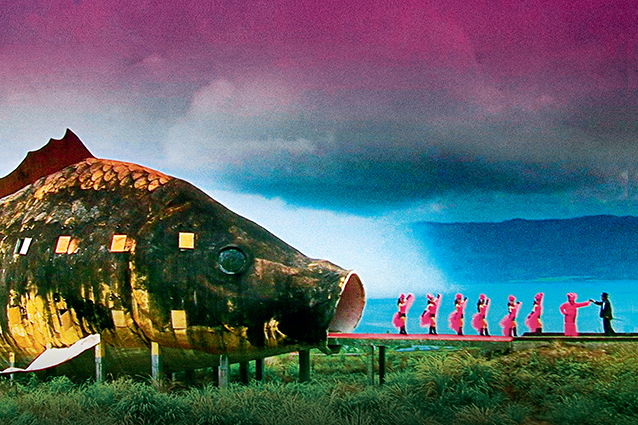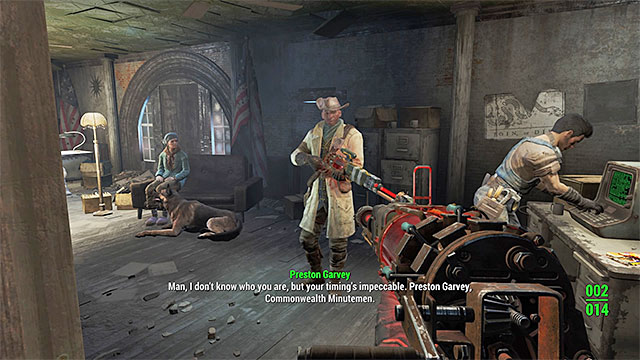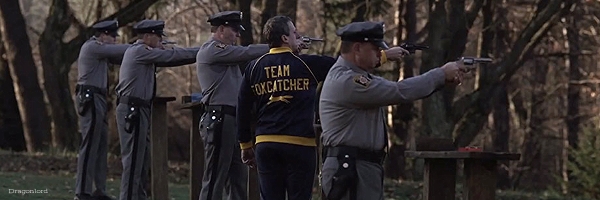On The Act of Killing

Death is one of the most significant events in our lives. It’s one of our only assurances. It is going to happen at some point. Whether you like it or not. Death will visit us, touching someone, somewhere, somehow. It’s an event that forever changes those who it touches. It has an impact that cannot be understated.
Yet somehow we have made it insignificant. To us, as players, death is a routine occurrence as we kill and die our way across dozens of games. We gun down enemies by the thousands, slash them to pieces, batter their bodies. We do whatever we can to kill as many people as quickly and as efficiently as we can, to the point where death loses any sense of importance.
We’ve been desensitized to violence, but not in the way that so many mothers warned us about. We are being desensitized to violence on our screens and in our games to the point where it is simply an assumption about the games that we play, where if you don’t kill anything in a game it is something to talk about. And occasionally something to ridicule, as is the general disdain to the so-called “walking simulators” of Dear Esther and Gone Home.

In the supposedly story and choice based RPG Mass Effect 3, I gunned down more than 1000 enemies by the end of my time with the game. That isn’t even beginning to talk about games like Fallout or The Elder Scrolls, where most of my interactions with the world come at the end of a barrel or blade.
And of course we have games like Call of Duty, Halo, or Battlefield, which exist in a separate kind of category to the more ostensibly story based games that we wish to discuss today.
How can we make death matter?
Multiple games have tackled this question in a certain way, giving us games like the Souls franchise (Demon Souls, Dark Souls 1&2, and for all intents and purposes Bloodbourne) along with dozens of imitators. Besides them we have the “roguelikes” randomly generated dungeons with permanent death, a mechanic which is incorporated into dozens of games at this point.
These games want to create a gameplay challenge for the player by wagering their lives and currency against the game’s systems, You need to build skill alongside whatever permanent upgrades you can collect while trying to desperately avoid death.
While this is indeed a challenge it is not the challenge that I am looking for.
I want death to matter. But not your death. The death of those that you kill. When you take a life in your game I want it to have an impact. I don’t want it to be an easy choice. Is it the only option? Is there any other way? What effect does it have on your character? How can we create an experience of killing that genuinely has an effect on the player?
The first step is looking at the death itself. Most of the times in games, death is rather clinical. You shoot someone as many times as it takes for their health bar to reach zero, and then their AI routines just cease to exist. They crumple into balls on the floor, absolutely lifeless, with almost no clue that they were once thinking characters. This switch is immediate and after doing it dozens, if not hundreds of times it becomes meaningless.
This is true not only in games but in many films, with characters crumpling to the ground after being shot, instantly dead unless they have some poignant message to pass on to their partner. Death might occasionally be a painful thing in movies, but for the most part it’s rather clean and simple.

There are exceptions to this. Radical exceptions that really hit you, hammer home what an awful thing death is, and show us how awful dying can be. If we look back at recent years, Foxcatcher jumps immediately to mind. At the climax of the film, John E. Du Pont, played by the fantastic Steve Carrell meets with Dave Schultz, played here by Mark Ruffalo, outside of his home. Du Pont asks Schultz “Do you have a problem with me?” Before he cold bloodedly shoots him in the chest three times, leaving the man to die in his wife’s arms as Du Pont drives off.
Everything about this scene is powerful. From the tension that has been built up over the film between the two characters to the first gunshot, cracking through the quiet winter yard as Schultz lies on the ground groaning and crying. There is nothing pretty about this death. Nothing poignant or romantic or beautiful. It happens for no reason and that makes it powerful. Those agonizing moments where you watch him crawling on the ground bleeding before he is shot for a third and final time make you wince.
It's hardly the first movie to do something like this, but I wish there were more. In the same vein there is the movie Burn After Reading in which George Clooney plays an adulterating US Marshall who shoots and kills Brad Pitt after he finds him hiding in his closet.

The death here is different than the one in Foxcatcher, but I love them for entirely different reasons. The death in Foxcatcher is powerful because it is as agonizing as it is meaningless. The entire movie has been building to this moment of tension between these two characters, but for all intents and purposes, his death means nothing. Here the death is quick. It is powerful.
You see Pitt hiding in the closet, watching Clooney get dressed. And we see Clooney walking towards the closet. As he opens the door Pitt starts to say something but he is immediately shot in the face. No warning. No buildup. No slow motion music. Just one second he exists, and the next he is dead, a splash of blood and brains decorating the wall behind him. The death is powerful because it shocks the viewer, showing us how pointless death can really be, killing off a beloved character all in a split second. How quickly life ends.
Of course, we cannot take about on screen deaths without mentioning the granddaddy of them all. Saving Private Ryan has some of the most powerful instances of war ever depicted onscreen, showing us that death can be meaningful in a movie, no matter how many times we see it happen. The first scene of the movie, the storming of Omaha Beach, shows to the audience the stark realities of war as young soldiers scream and cry and beg as they are blasted into little pieces by the German positions.
It's an idea that has been taken by a few games in a very interesting direction. Several Call of Duty titles have tried to emulate some of the horrifying deaths, with the recent Black Ops 3 including graphic dismemberments and executions. It’s a noble cause to try to show how graphic war can be, but it is quickly thrown to the side when the game asks you to mow down dozens of enemies as they run in a straight line at you, even as you blow off their limbs and gun them down. Here they lose their attempts at poignancy by quickly overwriting the message. Like an anti drug ad of a joyous man with a joint. There is no negative here.
This is the problem with most games that try to attempt to earn empathy. They show this message of how terrible violence can be, but it’s sandwiched between thick swatches of the game in which you are literally forced to kill hundreds of people to progress. This dilutes the message so much that it is made meaningless.
One of the most successful attempts at this was with the 2012 title, Spec Ops: The Line which famously adapted both The Heart of Darkness and Apocalypse Now into the game. The game focused on how violence affects the characters of the game, with one scene involving you bombing a rebel military camp with white phosphorous before forcing the player to walk through, allowing them to watch as mangled bodies and burned corpses desperately struggled for life, even showing a dead mother holding her child, both crisped by the raining white phosphorous.
While this game does struggle with the same ludonarrative dissonance as other games with this message, it is still one of the greatest attempts at making your choices to do violence matter.
So how can we make this better? How can we take this message that death needs to matter, that we are clearly trying to show across media, and have it reflect within players?
I think the first step is to reduce the amount of killing that we do in a game. It’s hard for an event to have significance if we do it every thirty seconds for an entire eight-hour game. So reduce the number of times we kill down to as few as possible, ideally just a single time.
Then we need to look at the way in which we interact with the world. Stop pointing a gun or a knife at everything we see. We are predisposing ourselves to violence through these weapons, giving us the expectation that we will use them, making us look forward to using them. It shouldn’t be our first option, but ideally our last option.
In that same vein, death cannot be the right choice. Or at least it can’t be the best choice. I imagine a world where you are forced into a situation where our predilections towards violence lead us to taking a lethal route, ending the life of someone’s else, before having it revealed to us that maybe things could have worked out a different way.
We need to follow this person both before and after they die. See the way in which death affects them. See how ugly it can be, see the toll it takes on the player for having to kill someone else. Death in this case needs to matter.
Clearly this isn’t a solution that a major studio is going to incorporate into one of their games, but imagining a cohesive two-hour experience from an independent studio, like the ones that made Journey or Dear Esther, giving us the experience off death sounds powerful.
Which it should be. Because death is the most powerful force there is. Let’s see it matter.
_____________________________________________

Tom has been writing about media since he was a senior in high school. He likes long walks on the beach, dark liquor, and when characters reload guns in action movies.
You Might Also Like:
Movies and CriticismDeath Doesn't Matter Anymore
Lighten Up
_____________________________________________